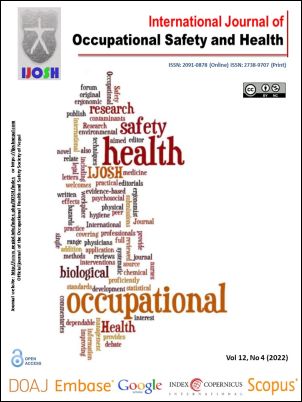Factors affecting post-traumatic growth in South Korean police officers by age group
DOI:
https://doi.org/10.3126/ijosh.v12i4.42574Keywords:
Korea,, post-traumatic, growth, age, policeAbstract
Introduction: Police officers are exposed to a variety of traumatic events, which can be physical or psychological. This study aimed to identify factors that influence Post-traumatic growth (PTG) in South Korean police officers, according to age group.
Methods: Raw data were collected from September 26 to October 9, 2017, for 269 police officers who are employed at 10 police offices in Seoul. PTG was affected significantly by age, marital status, monthly income, and police rank in pain perception and social support variables among general characteristics.
Results: Factors that affected PTG in the ‘20~29’ age group were resilience and pain perception, but in the ‘30~39’ age group, only Pain perception was significant, and in the ‘over 50’ age group, social support and pain perception were significant.
Conclusions: The development of mental health programs for police should consider the age group of the patients. Mental health care should also be continuous.
Downloads
Downloads
Published
How to Cite
Issue
Section
License
Copyright (c) 2022 E Lee, Seungwoo Han

This work is licensed under a Creative Commons Attribution-NonCommercial 4.0 International License.
This license enables reusers to distribute, remix, adapt, and build upon the material in any medium or format for noncommercial purposes only, and only so long as attribution is given to the creator.





